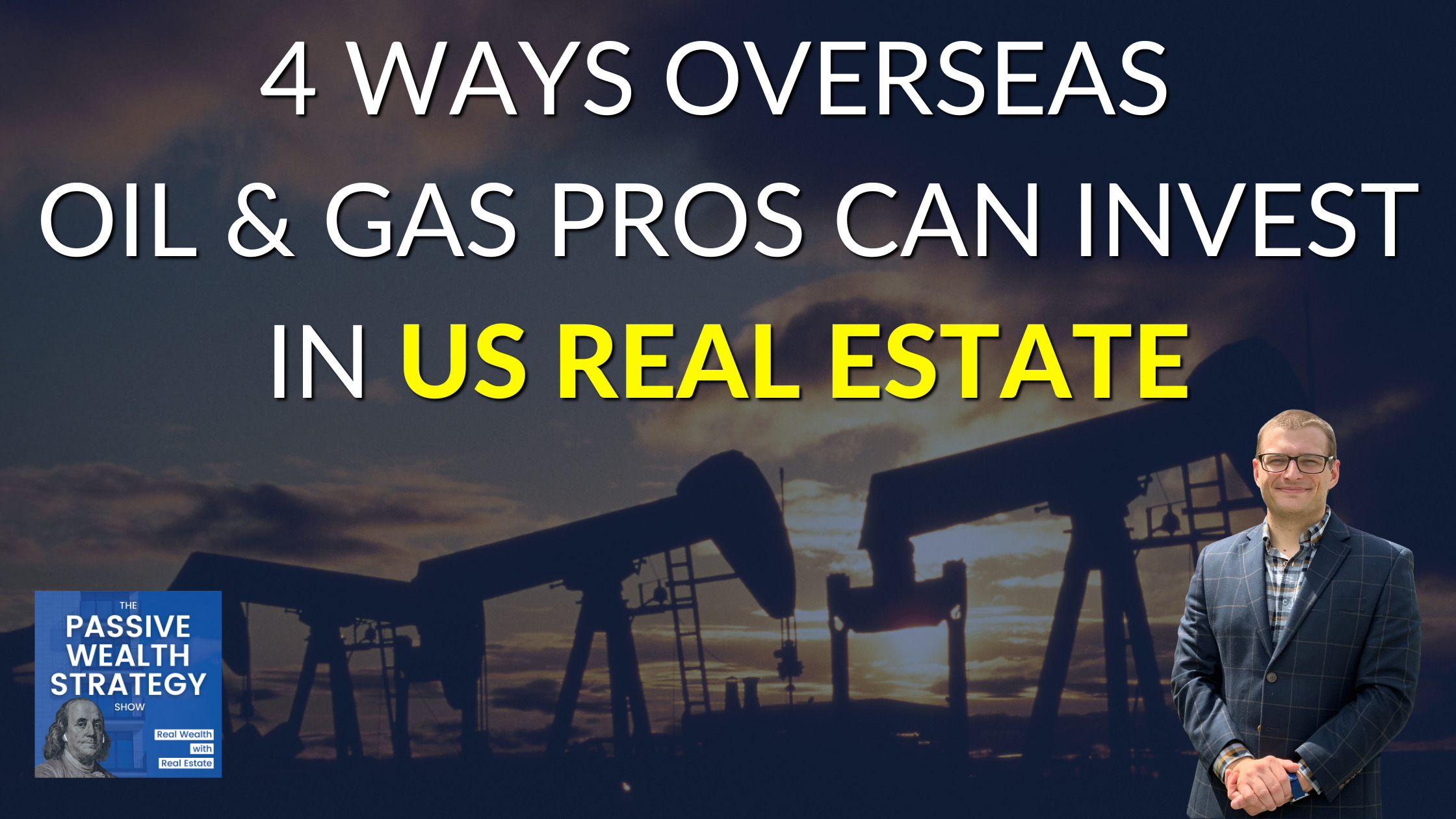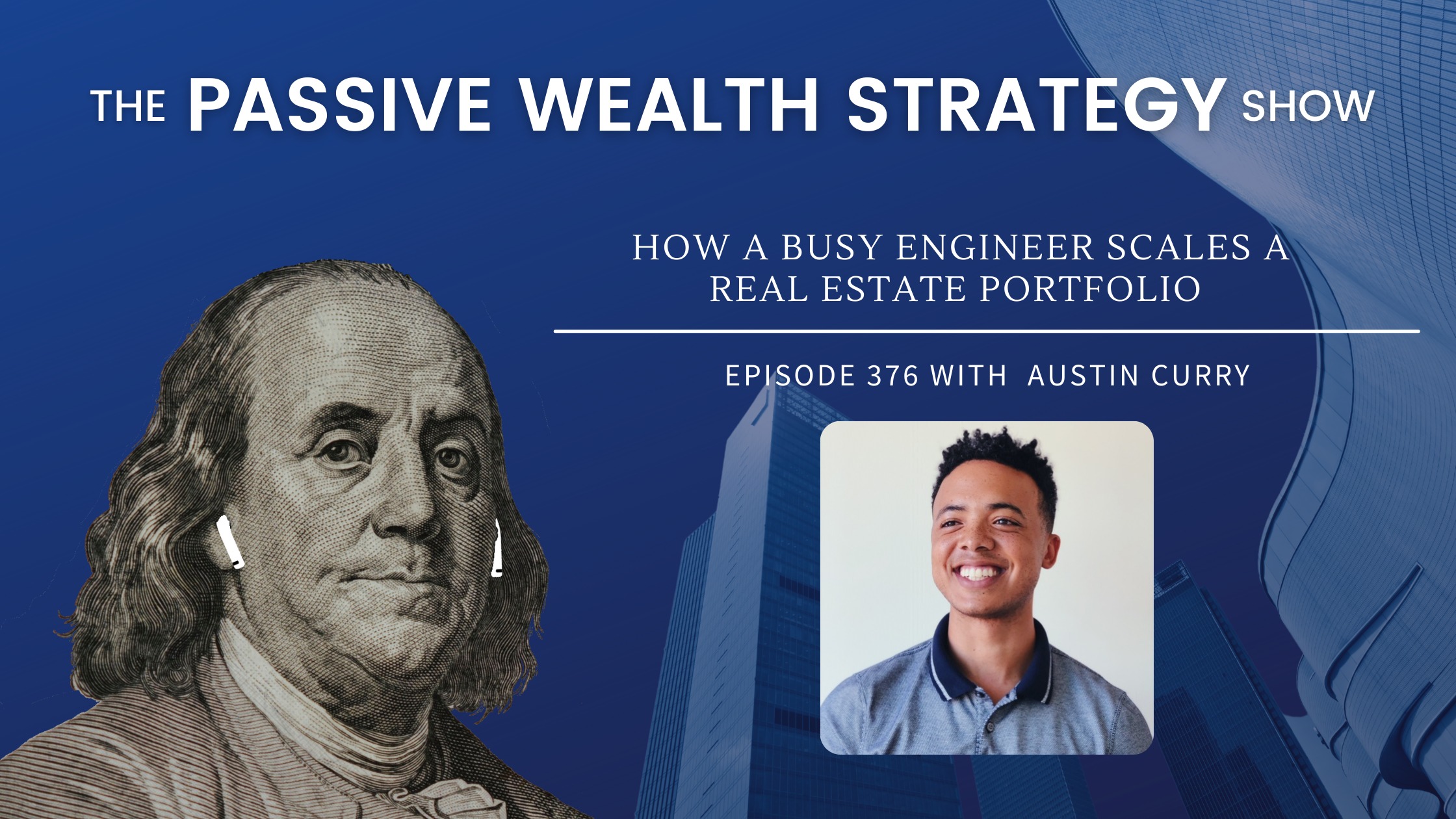
How a Busy Engineer Scales a Real Estate Portfolio with Austin Curry
Austin. Thank you for joining us today.
Thanks for having me, Taylor.
It’s been a great chat here. I feel like you and I could probably talk for hours upon hours and probably not find much that we disagree about for our listeners out there who don’t know about yourself and your background. Can you tell us about what you do in your business and how you invest in real estate?
Sure. So my name is Austin Currie. I’m based in LA. I’m a mechanical engineer by training and I invest and syndicate multifamily and mixed-use commercial and residential real estate. So I have a small team. I look at a lot of deals in the Southeast largely Atlanta and North Carolina. As well as some stuff here in LA.
And we’re just getting started. I’m about five, or six years into my journey. Started in Chicago, then a lot of learning and I just looked for opportunities to connect with folks like Taylor on podcasts, like these, to build a brand and build, deal flow and grow the network.
Awesome. Can you tell us a bit about your portfolio and the types of deals that you’ve done?
I’m sure we’re going to dig more into that in our conversation.
Yeah, absolutely. So I started with a duplex in Chicago and then from there and I’m sure you’ll have more follow-up questions about deal specifics, but I’m just running quickly through my track record. I did the duplex in Chicago, and I did a quad for the partner.
That was my first partner deal managed both of those. And then in 2020, we syndicated our first deal in Atlanta. So we did an eight-unit property in Atlanta and the vine city neighborhood. We had some funny stories about all those properties. And now we’re under contract on a short-term rental opportunity also in Atlanta, in the same neighborhood, walking distance from the Falcons station.
And then lastly, one of my business partners manages a small construction company here in LA. So we are opportunistically looking to take advantage of California had some new laws passed to allow you to build up to four units on any single-family lot. Of course, lots of rich people are very upset about that’s another topic.
So we’re looking to build some supportive housing. Co-living. Type or styles of project constant single-family lots. So that’s, what’s in the pipeline for us here at home.
Awesome. Great. And first I want to dig into, ask it’s a broad question, how do you make the time?
How do you make it work? You’re a, at least at this stage, when we talk a busy professional, you’ve worked at startups throughout your career. How are you finding the time to do you know, all of these deals and continue to scale your business, build these partnerships, shoot, and be on a podcast with me right now.
I, how do you make it work?
Honestly, I think I’m still systematizing that if you will, so it’s looked differently at every stage of my process. So when I started, when I was managing the smaller multi-families in Chicago it was just old school. Cause I was going into an assembly plant and working a full eight to 10-hour day.
And it was just grit and grind. It was upon the phone early going by the properties early, going by the properties app for work nothing fancy or call it well thought out about it. And then after struggling through that, I ended up hiring an associate to help which was an interesting hack.
I couldn’t afford the property manager for just a two-unit building. I hired someone who had never done it before and spun it out as a mentoring exercise, which is the, say if that was worth it or not, but, but so now. That was the start. In the middle, it got a little bit better.
I started working with partners, obviously for an eight-unit property. We have property managers and then the one where we’ll bring online, I’m working with a partner that has several Airbnbs in his portfolio currently. But to answer your question now, I worked from home most days, which is hugely helpful and I’m just incredibly Disciplined or dictatorial with my time.
So everything is scheduled on a calendar. My calendar tells me, that I probably wouldn’t know when to eat. I didn’t look at my phone. It tells me when to do everything on a calendar and a task list. So my favorite items are events and a task item And with those two things, I feel like I can conquer the world.
So nothing incredibly sexy, but that’s what I, that’s what I got for you
Hey, it’s a system. And a system that works and can be improved upon is, exactly. I think what we all need to, conquer the world to use your phrase. Then you mentioned not being able to really afford a property manager on that first deal.
I think a lot of people run into that, especially early on. And I would imagine there’s been, you’ve had some mindset shifts about the importance of property managers and having margin and the concept of a quote-unquote affording, or being able to afford a property manager. Whereas I would imagine you felt you couldn’t afford it before but maybe now you probably feel you can’t afford to not have a property manager.
If you all pardon the double negative, you tell us about any of those mindset shifts that you’ve had as you’ve learned by doing.
Yeah. Yeah. I think that’s a big one. So it’s the cost of a bad system or the cost of bad is what I learned. That was my tuition, if you will, is having cause along the way, I’ve also had a fire property manager.
So I had a really bad property manager for one deal and I kept them because they were quite affordable and the other options looked more expensive on paper. They were more expensive. But once I was finally fired. The immediate improvement in rents collected and turnover time and cost to turn units, of it, shot up dramatically.
And so the biggest lesson I’ve learned is just, to fight sunk cost fallacy, and understand the costs of poor work which are incredibly high. And so I guess to your question, What a two-unit, it is always going to be hard. You’re going to really crush your profits. So the property manager, but maybe the strategy is either scale quickly or short-term rent one of the units.
Does that bump your income? So high? The thing was at the time, I didn’t know how to underwrite deals when I bought my first property. So I really didn’t even know how to look at the levers that I could turn like I’ve spent so many years really approaching perfection with underwriting. At least these basic deals.
Like now, when I look at a problem like that, I have a huge spreadsheet and I’m just turning 10 different dials to figure out how to make the deal work in a manner that works for me. So the deals in Chicago. It works for me is going to be, to have someone managing it. So I had to figure it out using those tools.
Absolutely. That’s that engineering mindset, right? Look at the numbers and how can the numbers work and how can the business plan work now, if we can I’m curious about your evolution on underwriting and learning about underwriting from that first deal to the deals that you’re doing now, obviously you’ve you have a system now you’re, really.
Approaching it as a business owner, rather than, I don’t know, somebody that’s just trying to do a deal. So you tell us about that, the evolution of your mindset and, on that topic of underwriting and how it went from, I guess I’m curious how you even approached looking at that first deal and then how that’s evolved to how you look at deals today.
Yeah. I think. There are so many resources on the internet, but a lot of the more social ones, like the Instagram personalities and whatnot, make it all look so easy. And so I’m very much the opposite of risk-averse. I would say. I saw when I saw, when I was reading, doing my reading on real estate investment and this and that, and back in 2015, I was like, of course, that.
Like people way less smart than me, have figured this out. So I kinda jumped in, I did no analysis, but they didn’t know how to, I put, three and a half percent down on a property that only costs 150,000. So my exposure was pretty well. And I pretty much got my lunch eaten on that deal.
That didn’t go well. So I, that was my, that’s what I called my tuition to get in the game. And after that, As I was exiting the Chicago properties, the second one really went quite well, the quad. And when I was exiting, I was also transitioning to syndicated and I spent years just consuming everything I could consume.
Like I was pretty deep in analysis paralysis, to be honest, but I had the. So from 2016 or, sorry, I bought the quad in 2017, from 2017 to 2020. I didn’t buy new deals. I operated the two, of the six units I had in my portfolio. And then it was just input consumption, podcasts, books, papers, networking. And in 2020, I network to the point where I had a team of people, I was interested in working with. And one of the guys was working for a private equity firm, real estate, private equity firm. So he was rather overqualified to work with someone like me, but we hit it off. Our demographics are the same age, same interests, really excited about the mission of what our firm is today.
And he was the first lens. Like the first person, I talked to looking at deals, underwriting them, and sending me models to look at, to digest as a part of that jesting and deal. So looking at something other than a listing and from there, that was the point where I was like, this is the answer.
This is what I am missing. This is what has not happened in my first two deals that caused me a lot of money on my first deal. And from that point, I was like, I have to learn how to do this. And I’m an engineer. So like I do calculus in my real job. I was like, I can figure out, or I can figure out a spreadsheet as addition, subtraction, multiplication here.
Like I can figure this out. So from there, it was a lot of times like spinning models with him, creating models, passing them to him passing them back. A couple of online courses and just going as deep as I can on understanding the professional way to do it and seeing the difference when I post a deal from that angle, when I suddenly, I was the shark in the water versus the goldfish if you will because I feel if you read it Instagram post, And then you go do a deal, like you’re jumping into a pool and you think you’re a shark, but you’re a goldfish, right?
Because you don’t know anything. You’ve seen five lines. Someone told you, you could put $10,000 down and FHA a house, and then you’re on a property and you rent one side and you’ll make a ton of money. I was like that might’ve worked well for you and 2014. But as we talked about, like in today’s price points, You’re fighting over pre-like shrinking margins in effect.
So as that occurs, you need to be more and more precise with your analysis beforehand. And I’ve just, I saw that reality and I wanted to be that guy that got, it felt really comfortable where I’m looking at a deal that may only net a 5% IRR, but I know everything that I need to control to deliver that 5%, which is pretty poetry.
But at least I know what it takes and I know how to get there. So that was my motivation.
Interesting. Okay. So you did those first couple of deals. Learn some lessons, maybe took some lumps. If you will take a few years to actually operate a few of those properties, learn the market, build your mindset and then build your network, build your team.
And then when 2020 rolled around and. Unfortunately, the pandemic also happened, I want to break into how that, that the pandemic may have helped or hindered or impacted, the growth of your real estate business, how that dynamic all worked.
Sure. Yeah. So it helped me personally because I was able to transition to working from home.
I was forced to work. So that gave me a lot more control of my own time. Whereas I can schedule meetings, I can talk to a real estate professional. I can look at a deal. I can do all these different things in my workday. Professionally it made it a lot more challenging I guess not even a lot more because I’m new, I’m jumping in the game.
So we went under contract for a property in December. 2019. We went under contract for portfolio three buildings in Atlanta, obviously. And so we were raising capital and it was going well, first time now, we had a great model. We had a nice deck. We had great headshots. We felt really good about it.
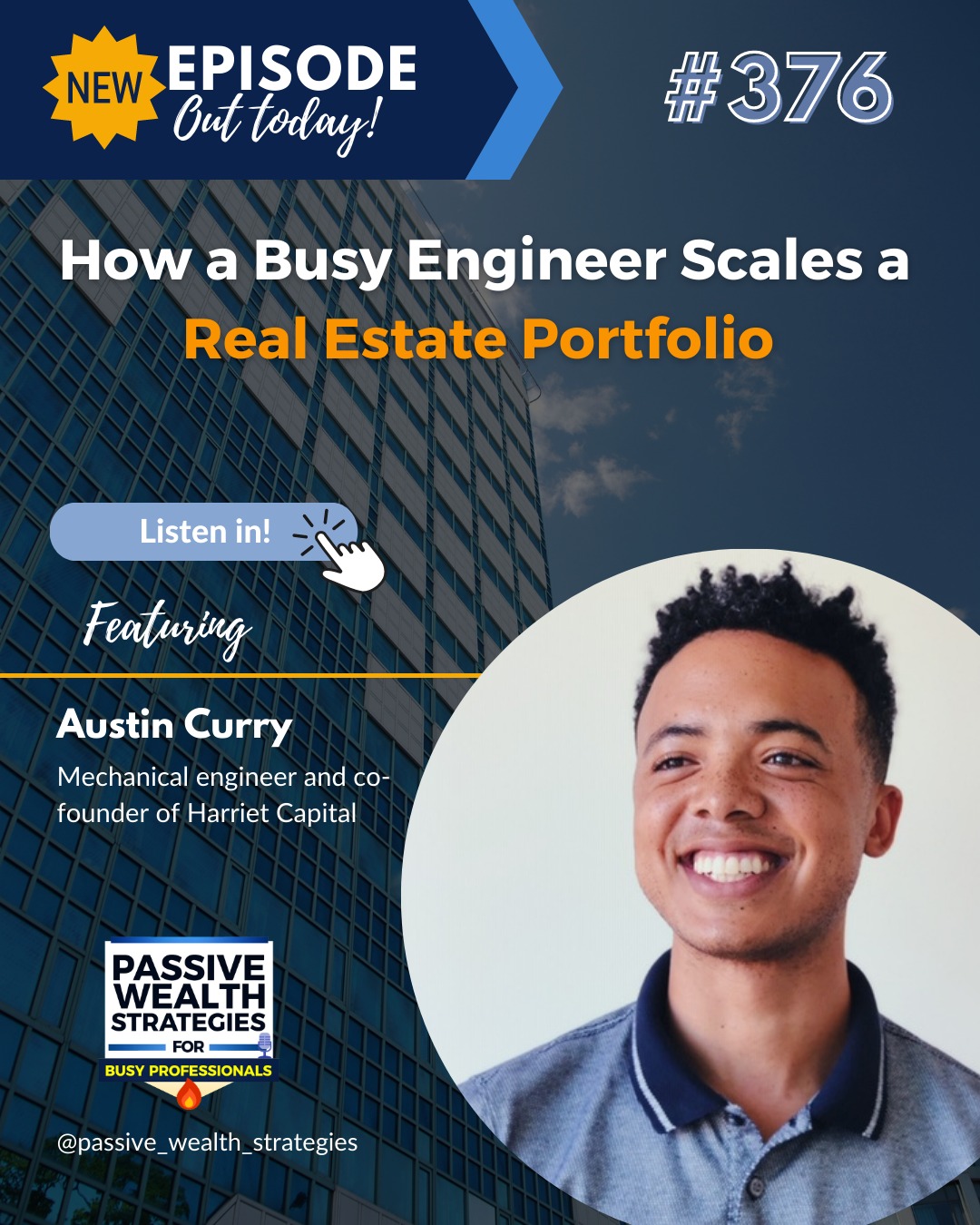
How a Busy Engineer Scales a Real Estate Portfolio with Austin Curry
We’re like, we’re gonna, we’re going to do it. And we did it. We got all the verbal commits for the deal. March 20, 20 happens the worst day in the history of the stock market. So most people that were going to invest the less with planning on pulling their money out of the stock market, which had been doing great until that day.
So then half of that money disappears. And so half of our verbal commitments disappear overnight. So we fall out of contract on the deal. We’re scrambling, we’re trying to figure out what the hell is going on. The world was ending allegedly. And basically, we circled the horses and were able to close one of the buildings.
So that’s how we got the eight units that we have. After that, to be honest, I don’t think the pandemic has had too much impact one way or the other, the city of Atlanta really didn’t close down for very long. So we didn’t really fight with a lot of tenants being out of work and things of that nature.
Obviously, as you’re well aware deals have still been being done in huge numbers every single day in every market. So no one is talking. Flip the sign to close and went home. That’s not happening either. So beyond just being in that position, when the stock market crashed I wouldn’t say that the pandemic has slowed down much.
That’s good. That’s good. And we did see interest rates massively fall. Now they were already trending downward just prior to the recession as well. Most people, forget that the fed was cutting rates before anybody thought a pandemic could be a thing because the economy was, not in the greatest position at that point.
He cut rates even further. And that has just continued to, fuel a lot of real estate deals, but it sounds like you didn’t struggle after that deal was closed. You didn’t struggle with anything along the lines of the eviction moratorium. Presumably, you had a property manager in place that helped you navigate those things.
There’s also been a lot of, supply shortages, things like that. Have any, were any of those, an issue where you have a success navigating this?
Not really. So I’m big. This is a controversial topic, but I’m a big fan of subsidized housing renting to subsidized tenants, and I’ve had the best of the best.
And the worst. The worst is, remember I start on the south side of Chicago and now I’m in Atlanta and they have a huge backlog of people that need housing, but the Atlanta housing. So there’s no shortage of tenants. If you can keep your property in good shape, right pass inspection in a timely manner.
Regarding the eviction moratorium, I suppose we had one tenant that fell quite behind, but once again, they were a subsidized rent tenant. So they were only missing payments of 85 bucks a month. And so the eviction moratorium in the south, this is a thing, but when you’re considering the markets, you need to look at housing laws and, however you feel about red vs blue, red states are a lot more favorable to landowners.
That’s just the thing. I’ve evicted somebody and it’s the ugliest thing to do. That to evict someone, I have to evict someone in Chicago. And that was a nightmare and destroyed all profits for that deal. And I almost had to evict someone that Atlanta, but we did not, we were able to work it out, but it’s just worth noting.
So the moratorium didn’t affect me too bad cause we weren’t hemorrhaging that bad based on what their payment amount was. And then they ended up finding other housings. We were able to come to a minimal agreement. But we were tracking it, we’re tracking it every day. We’re tracking the state laws, the national laws to see what was happening and, most of that has ended.
That. I, so I would say that it probably is a controversial opinion, regarding subsidized housing. But the reality is that the government kept paying, those bills throughout the eviction moratorium and throughout the pandemic. That’s a plus, right?
Yeah. And my thing is when you’re doing I hate class ABCD, I think that’s a really good way to describe housing. I’ve done a lot of class C class B housing, workforce housing, affordable housing, whatever you want to call it. And the tenants that I’ve faced, the problem that I have faced with subsidized rent sentences are the exact same problems I faced with market-rate tenants.
So it’s hard to be the fact that the government is cutting that check at midnight on the first of the month come hell or high water. So that’s. Two sentences on it.
We had also talked though. I want to just touch on this year during the. While we were before we recorded, we were talking about how you looked into basically flipping near yourself and in California years ago and came to the conclusion that it wasn’t the right fit for you.
And just want to touch on that and the work that you did there, and then how you came to the decision. Hey, flipping in California is a high-risk, perhaps low reward type of situation. There are better strategies.
So it’s actually a pretty funny story. I kinda got scammed into attending a real estate seminar paid for a real estate seminar.
Which, when you’re deep in your learning journey, you’re very susceptible to these types of things.
Yeah, you don’t see the scams coming as well. It’s just the fact.
Yeah. Yeah. So long story short, I paid for one of those Dan Merrill, like home flipping courses, not intending. And I showed up him. Basically, I was in this big black Marriott ballroom somewhere in Oakland.
And for several hours, I just extol the virtues of flipping houses. And like it’s any idiot can flip a house it’s dominant. You’re not already doing it. The more debt you can take the better. Take the hard money. It doesn’t matter what the interest rate is like all kinds of crazy stuff. And then they try to upsell you into the $50,000 masterclass.
If they happen to be a sponsor of your podcast. I apologize.
They are not. But I’ll just be clear. These are the things you’re saying. I’m not saying these things. I don’t have any knowledge on this topic.
I have nothing against fans. I did learn a fair amount. It was very interesting, but so anyway, I went to this course, they taught me how to flip a house.
So afterward, I was like, all right, I’m going to flip the house. So I go and I wanted to get involved in real estate and Oakland. Anyway, I never flip houses. I flip the house in Chicago once. And so I got under contract for a house in San Jose was $700,000. It had a major fire and it had several homeless people squatting in it, but there was a promise of a Google campus was going to be open, like right down the street.
So that this is a million-dollar house. You just have to flip it and make a hundred. Easy. I was like, okay. So I went on a contract of 700K I have contractors in and out of the house. This is my first intro to underwriting a deal, cause one benefit from what I referred to at the scam is they did give me a nice little plug and play spreadsheet, which was the first time I had an Excel spreadsheet, which showed all the costs character.
CapEx, all these different things and it’s calculating a number for you. It’s calculating return. So for all that shit, I talk that was my introduction to underwriting. And but along the way, I’m getting all these quotes talking to hard money, lenders, I’m understanding, draw schedules and all these different things.
And I’m realizing that the deal is very tight, right? Based on comp sales and after repair value. And total cap-ex renovation costs. So I’m like, okay, I’m risking this much money, $700,000 to make. I don’t know, let’s say $30,000. And I’m like $30,000. This is another calculation that you have to make when you are a, you have a day job, right?
It’s it the risk? Is this life-changing money? So $30,000 is a whole lot of money. But when you have a day job, it’s not life-changing money for most people. And so I was like, what’s the downside risk. If I mess up a $700,000 deal, it will take me a very long time to recover from that financially.
And so therefore I backed out of the deal and killed the company. And we doubled down on long distance. My properties in Chicago are quite stabilized by this time I was making a little bit of money every single month and I was like, I fit ain’t broke, don’t fix it. So I started looking again and properties in Chicago and network and kind of built the team that I’ve been working with now and eventually pivoted and went toward Atlanta.
But we’ve been running with this model.
Interesting. We don’t talk about flipping on the show very much, but I’m not really a proponent of flipping like a real estate quote-unquote investing strategy for the vast majority of people. I don’t even see it as real estate investing, frankly.
The IRS also doesn’t see it as real estate investing because it’s taxed very highly and risking 700 grand to make 30 grand is not great. Risk reward calculation. I’m glad you figured that out before something potentially went wrong.
Yeah, I agree. It’s, we, everyone gets into real estate frequently for passive income.
But then they’ll go after the most active ways of doing so. So everyone will pitch you on, have your money, make your own money, retire early, all this good stuff. And there’ll be like, take my wholesaling class. Like wholesaling is the opposite. It is hard for those people to take a thousand phone calls a day.
That is not, there’s nothing passive about that. There is very little passive about flipping a house either. And I’d like to say that the government agrees. So it’s just interesting how. They’re there the lowest barrier to entry. So I understand why, but it’s interesting. How many of us are funneled that way at the outset?
Absolutely, man. Wow. I’m glad we dug into that right now. We’re going to take a quick break for our sponsor. All right, Austin, I’ve got three questions. I ask every guest on the show. Are you ready?
I’m ready.
Great. First one. What is the best investment you ever made other than in your education?
I think that the second investment I made was the best one. So the second deal I did was a quad and it was where the partner is still a friend of mine. And the reason I was really powerful is that it did quite well for us, but it gave me the confidence to continue. As I mentioned, the first investment was me getting kicked in the teeth in a way that was paying my tuition.
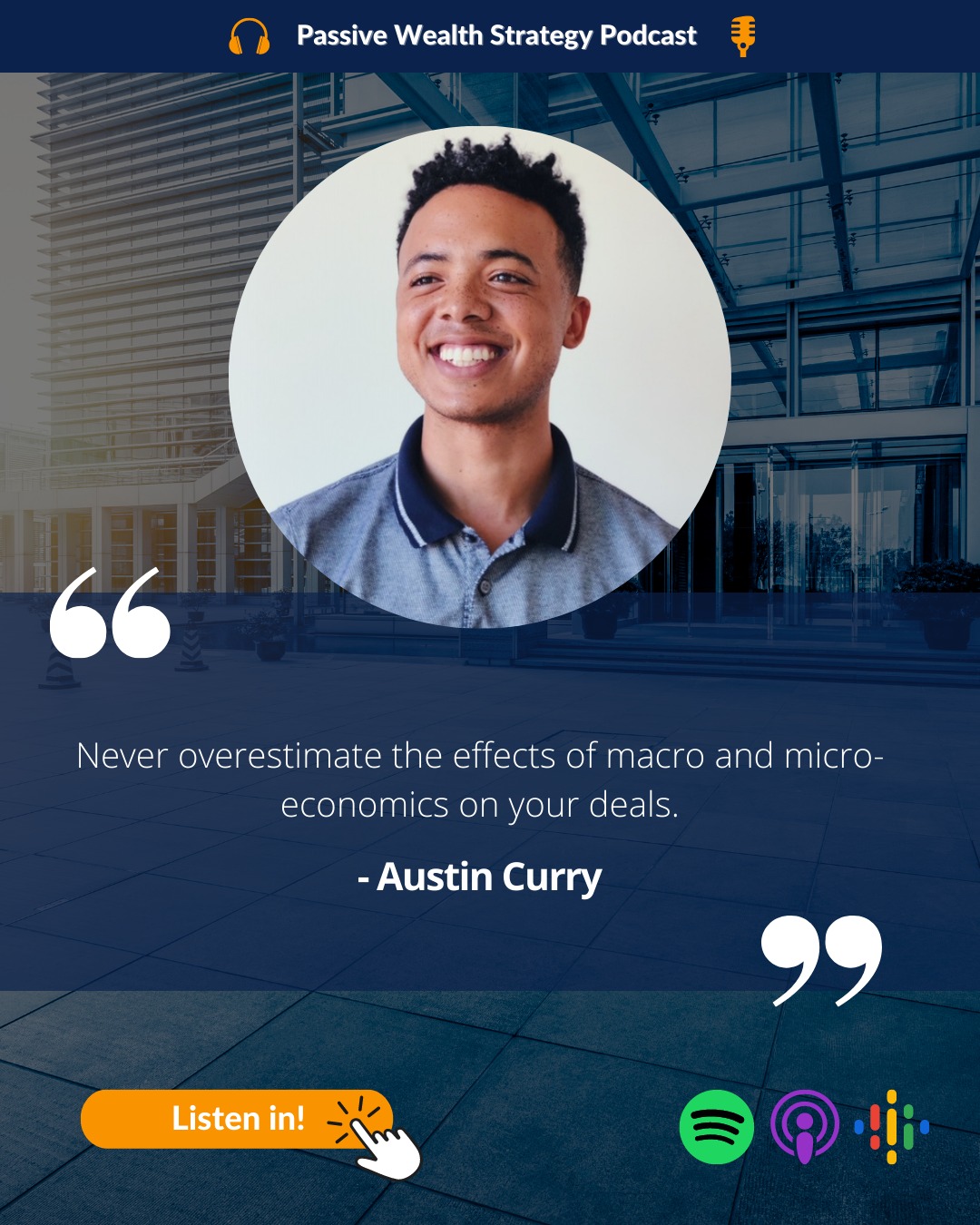
Never overestimate the effects of macro and micro-economics on your deals.
Austin Curry Tweet
If you will, of learning the game, I made a ton of. And I could have tucked tail and ran after that one, but fortunately, I went ahead and pushed through and did the next one. And that went quite well. And I started understanding the benefits of working with partners, and that really changed my whole approach to the investment.
Awesome. And I appreciate you being open and honest with us about these deals that didn’t go the way that you want to because the reality is there are a lot of people out there with enormous real estate portfolios who come on podcasts exactly like this. And don’t talk about the deals that went wrong and believe me, they all have deals that went wrong.
They just want to sweep it under the rug and not be, forthright about it. So I appreciate you being honest with us about that. On that note, we had the best investment. Now we go to the other side of that coin, the worst investment. What is the worst investment you ever made?
Financially that first one was probably worse, but I think it was a valuable step in the journey. So I would say this is gonna sound a little bit funny, but it’s true. That Dan Merrill, no, I’m just kidding. Not that class, but I invested once like a couple of hundred bucks. In and like an options course which is peak like a pandemic side hustle.
I don’t know. Anyway, I spent a couple of hundred bucks. I learned about trading stock options for a while, and that was a complete waste of time. But the upshot was what you said, shiny object syndrome, recognizing how bad it had gotten from me to where like I’m looking at asset classes that are not even that interesting and incredibly gimmicky and high-risk.
And so since then, I’ve just made my wife, my accountability partner, and is really locked in yes, there are hundreds of asset classes, new ones come out every day. It’s only going to get crazy with crypto, but you can only be an expert in a handful of things you needed to rely on other people in your network, three experts in other things.
And. And so that’s what I would say was my worst investment, but mentally it was helpful. Cause it was a moment to look in the mirror and be like, what are you doing, Austin?
That happens to the best of us. So there’s nothing wrong with that. My favorite question here at the end of the show is what is the most important lesson you’ve learned in business and investing?
Yeah, this is one I’ve been reflecting on a lot recently, but. It’s not the lesson. I haven’t framed this in an incredibly pithy way just yet, but it’s the lesson is never to overweight the effects of macroeconomics versus the micro factors of your deal. So what that means is when I was learning to underwrite and reading a lot of books about economics and things of that nature.
You just taught all of these times about stuff we were talking about regarding inflation rates, appreciation, housing, supply, all these different things that are at our market and our asset classes, all of those things are true, but at the end of the day, economics is not hard science, as we know it’s part science, part art, cause it’s psychology.
And so all of these things are actually people looking at all the. What already occurred and attempting to understand why it occurred. And that’s useful from a framework and mental model perspective. But when you are actually in a deal, it’s not all that useful. It’s look back and try to understand how the market got to where it got.
You are far, you are more likely to either mess up your deal or improve your deal by nailing or missing. The basic operational details of what you have going on. So I tell this to everyone who I talk to, lots of people want to get in, and I’m like, don’t read every book on the economy. Yes. The values go up and down and people with PhDs don’t even understand why completely the best thing you can do is nail the details, and understand your cost drivers, which are generally speaking in multifamily property taxes.
Bye, start there. Just nail your details and recognize that will be, that will serve you far better than going and getting a master’s degree in economics and, waxing philosophical on why your rents only went up 2% instead of the 3.5% you’ve projected in yours.
Nice. I love that. Don’t count on the market to save your deal.
Have a good business plan and really execute, I think it is the way I would maybe sum up what you’re saying. I think if I understand what you’re saying and Austin I’m well, thank you for joining us today. Thank you for sharing your story and your lessons with us. If folks want to reach out, if they want to get in touch with you, if they want to learn more or anything like that, where can they track?
Yeah. Mostly email. So [email protected] is our business email. That’s where we connect with investors, or we begin the conversations, and where we send out deals. So I love to meet people that way. I’m on Instagram, off and on. And that is Austin, C U R T. And I’m mostly just talking real estate and investment there as well.
But email is really where the conversation starts for me. So helpful to see a bunch of your listeners over there, bugging me and asking me lots of questions about all that stuff.
Awesome. And our social media expert, Rem on our team. We’ll be sure to tag you on Instagram. And I want to thank you for joining us once again today to everybody out there.
Thank you for tuning in. If you’re enjoying the show, please leave us a rating and review on apple podcast. Five stars. If you don’t mind you guys, I appreciate that so much that helps other people learn about the show, because that helps us rank high. And the apple podcast ecosystem. And I’m always honest with you guys that gives me a nice little warm and fuzzy feeling because I get to see that you’re engaging with the content and you’re escaping the wall street casino along with us.
If you know anyone who could use a little bit more passive wealth in their lives, please share the show with them and bring them into the tribe. Don’t forget to subscribe no matter what podcast app you use. Catch us here every Monday, Tuesday, and Thursday. I hope you have a great rest of your day and we’ll talk to you on the next one.
Bye-bye.

How a Busy Engineer Scales a Real Estate Portfolio
About our Guest
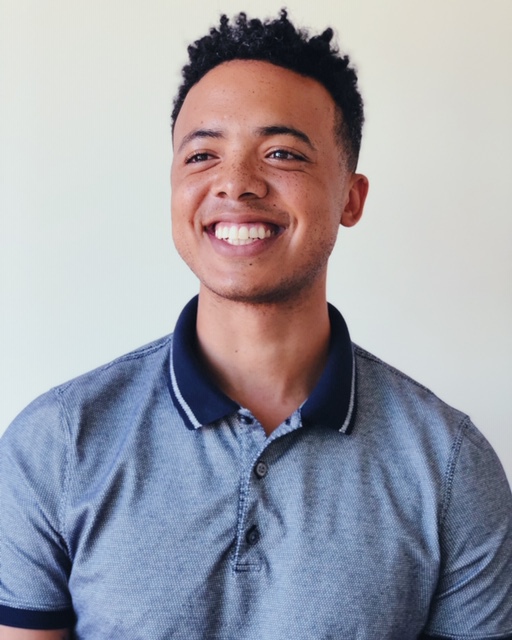
Austin Curry
Austin Curry is an engineer, investor, and advisor of small businesses. He began his real estate investing journey in 2016, enthralled at the concept of financial independence discussed all over the internet.
After hustling a few smaller multifamily properties in Chicago, he quickly realized he’d need a team to reach any real amount of scale. After a couple of years of networking and learning, Harriet Capital was formed. Harriet Capital is a black and woman owned firm focused on multifamily and mixed use syndication opportunities in a handful of markets around the US.
Austin’s next urgent goal is to reach a level of scale that’ll allow him to walk away from his “day job” and go full time in investing. In his free time, Austin loves cooking, and tinkering on his old cars.
Episode Show Notes
Austin Curry is an engineer, investor, and advisor of small businesses. He began his real estate investing journey in 2016, enthralled by the concept of financial independence discussed all over the internet. After hustling a few smaller multifamily properties in Chicago, he quickly realized he’d need a team to reach any real amount of scale. After a couple of years of networking and learning, Harriet Capital was formed. Harriet Capital is a black and woman-owned firm focused on multifamily and mixed-use syndication opportunities in a handful of markets around the US. Austin’s next urgent goal is to reach a level of scale that’ll allow him to walk away from his “day job” and go full-time in investing. In his free time, Austin loves cooking and tinkering with his old cars.
[00:01 – 07:58] Opening Segment
- Get to know Austin Curry
- Mechanical engineer and real estate investor and syndicator
- How Austin manages his time with his career and real estate investing endeavors
- Two Things that Help Austin Conquer the World
[07:59 – 16:34] How a Busy Engineer Scales a Real Estate Portfolio
- The Cost of Bad Systems and Lack of a Property Manager
- Underwriting Improvements from the First Deal
- The Challenges of the Pandemic for Austin and his business
[16:35 – 28:24] Seminars, Risks, and the Pandemic
- Austin talks about eviction moratoriums during the pandemic
- Scammed into a Real Estate Seminar
- House Flipping and Taking Risks
[28:25 – 38:43] Closing Segment
- Quick break for our sponsors
- The first step to growing your wealth is tracking your wealth, income spending and everything else about your finances, you can start tracking your wealth for free and get six free months of wealth advisor. Learn more about Personal Capital at www.escapingwallstreet.com
- What is the best investment you’ve ever made other than your education?
- Austin’s second investment
- Austin’s worst investment
- Options course
- What is the most important lesson that you’ve learned in business and investing?
- “Never overweight the effects of macroeconomics versus the micro factors of your deal.”
Connect with Austin Curry through [email protected] and Instagram.
Invest passively in multiple commercial real estate assets such as apartments, self storage, medical facilities, hotels and more through https://www.passivewealthstrategy.com/crowdstreet/
Participate directly in real estate investment loans on a fractional basis. Go to www.passivewealthstrategy.com/groundfloor/ and get ready to invest on your own terms.
Join our Passive Investor Club for access to passive commercial real estate investment opportunities.
LEAVE A REVIEW + help someone who wants to explode their business growth by sharing this episode or click here to listen to our previous episodes
Tweetable Quotes:
“There are hundreds of asset classes, new ones come out every day. It’s only gonna get crazy with crypto. But you can only be an expert in a handful of things need to rely on other people in your network to the experts and other things.” – Austin Curry
“You are more likely to either mess up your deal or improve your deal by nailing or missing the basic operational details of what you have going on.” – Austin Curry







